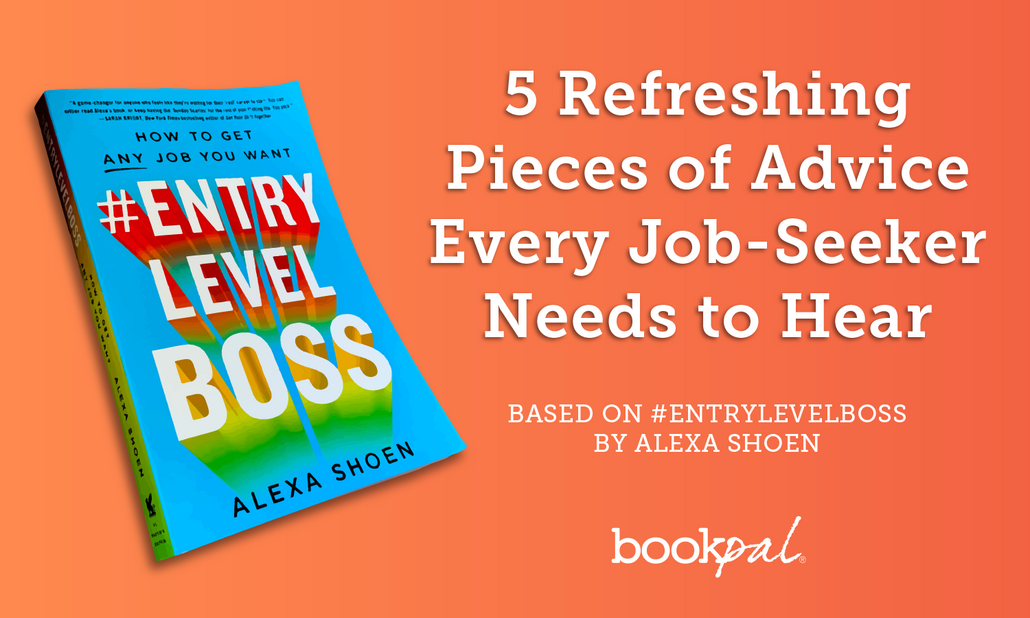
Posted by Danielle Brown on Jul 13, 2020
5 Refreshing Pieces of Job-Hunting Advice Every Job-Seeker Needs to Hear

Based on the book #ENTRYLEVELBOSS by Alexa Shoen
In her book #ENTRYLEVELBOSS: How To Get Any Job You Want, Alexa Shoen demystifies job-hunting and everything that comes with it: resume writing, networking, self-promoting, cover letter writing, and upskilling. With a refreshing, modern approach to the job search, the internet’s favorite career coach gives clear-cut advice with game-winning examples and templates.
Based on her book and the #ENTRYLEVELBOSS methodology, here are five crucial pieces of advice on job-hunting that every job-seeker needs to hear.
1. Get specific about what you want.
“Defining the ecosystem in which you want to work is easily the most important and strategic thing you can (and should) get done today.”
Shoen refers to the mass-applying frenzy most job-seekers find themselves in as the “job search junk food diet.” To fight it, she’s crafted an easy, fill-in-the-blank elevator pitch template to use in job-hunting based on three simple questions:
-
-
- What kind of role do you want?
- Where are you physically going to get hired?
- What industry do you want to work in?
- BONUS: What specific thing can you do that will help a company save time or make money (or both)?
-
Frankenstein your answers into a single-sentence pitch that’s perfect for the top of your resume, your LinkedIn bio, or an introductory networking email. As Shoen says in her book, “Humans just want to hire competent, friendly people they trust. Your job is not to pretend to be somebody else. Your job is to be the most highly skilled version of yourself, to reach out, to make some small talk, and to break the ice.”
2. Don’t disqualify yourself.
“Any candidate requirements you come across are not really requirements at all.”
Nip that imposter syndrome in the bud while job-hunting. When you see a job listing requesting 1-3 years experience, don’t just pass it by assuming you’re not what they’re looking for. As Shoen explains in #ENTRYLEVELBOSS, any qualifications outlined on a job posting are qualities they hope every candidate has. Essentially, it’s a spit-ball, spaghetti-on-the-ceiling wishlist the company is using to try to attract the candidate they think they want. If you think you can do the job—and do it well—you need to apply and prove that you’re the candidate they need.
3. Every experience counts.
“If you develop skills on your own time, you get to claim those skills on your resume. You should be shouting about them, in fact.”
Shoen touts that there’s no such thing as “unofficial” experience when job-hunting. Whatever experience you gain is experience you should be using to pitch yourself as valuable to your potential employer. In our Live chat with Shoen, she joked that, “People always treat their resume as like a confessional document of like, 'Here's everything I've ever done. I'm so sorry that it's not enough.'" Instead of info-dumping your entire life story, think of your resume as a one-sheet pitch outlining your most relevant experience and transferable skills for the job you’re applying for.
4. Don’t be afraid to ask for help.
“The most important thing to remember when writing [a networking email] is that it could possibly be forwarded to someone who could hire you. Always write for that audience.”
Parts 6, 7, and 8 of #ENTRYLEVELBOSS focus on the art of networking with Shoen’s telltale modern twist. She argues that you can create your own destiny—partially by crafting your own serendipitous moments but also by being straightforward. Here are a few clear-cut steps to getting what you want out of the network already available to you:
-
-
- Don’t rule anyone out. Tap into every community you’re connected to: family, friends, acquaintances, traveling companions, friends of friends, colleagues, colleagues of friends, siblings of colleagues of family… (You get the picture.)
- Introduce yourself. Give context for who you are, how you know this person, and why you’re reaching out.
- Establish common ground. Find some overlap in where you went to school, what you studied, where you’ve traveled, or what hobbies interest you.
- Make it easy for them to help you. Don’t be afraid to ask for what you want, whether it’s a connection, conversation, or something else, and the clearer you make it, the better.
-
5. Your degree is not your last achievement.
“You need to move on. Continue achieving rather than continuing to wish your diploma could act as a makeshift life raft. It will not hold you.”
In academic careers, you’re conditioned to expect the next grade level, the 301-to-401 upgrade, the next degree or certification. But in the real world, there are no automatic promotions just because you did the work. Rather than let the disillusionment bring you down, Shoen suggests taking your education into your own hands. Pursue new skills, learn lateral or competitive platforms, and shadow those who know more than you.
Don’t overreach by choosing a whole new knowledge path like ‘learning Mandarin,’ but don’t let your degree be your last great achievement in life. If you’re not sure where to start, look into courses on Skillshare, LinkedIn Learning, or Udemy that interest you. As Shoen writes in her book, “The curious will win over the educated, every time.”
For more advice on job-hunting, networking, and more, check out our workshop on “Navigating the COVID-19 Job Search with Alexa Shoen.” Her book #ENTRYLEVELBOSS: How To Get Any Job You Want is also available now to order in bulk quantities for your school, community, or organization.
Be the first to hear about new author events, blog posts, and more.
This post was written by Danielle Brown, Ecommerce Specialist at BookPal. She is currently reading Simon vs. the Homo Sapiens Agenda by Becky Albertalli.



